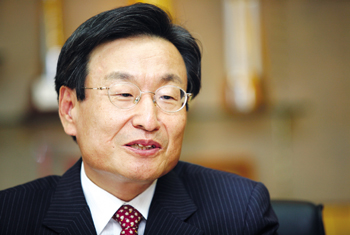Honam Petrochemical Joins Hands with Mitsui in PP Catalyst Venture
HPC is stepping on the gas to expand its business portfolios in Korea and abroad
 In the latest move, Honam Petrochemical Corporation (HPC) has teamed up with Japan¡¯s Mitsui in a joint venture to build a polypropylene (PP) catalyst plant. HPC said on Oct. 5 the new plant will be built at its third Yeosu plant by 2012 with 20 billion won in capital invested at a ratio of 50:50.
In the latest move, Honam Petrochemical Corporation (HPC) has teamed up with Japan¡¯s Mitsui in a joint venture to build a polypropylene (PP) catalyst plant. HPC said on Oct. 5 the new plant will be built at its third Yeosu plant by 2012 with 20 billion won in capital invested at a ratio of 50:50.
PP catalysts are used to spur reactions in the production of PP items, raw petrochemical products. A few global players, including Mitsui, Germany¡¯s BASF and Basell, have the technology to produce PP catalysts. Mitsui, a global value-added chemical producer, has focused on the research of catalysts, which play essential roles in the chemical industry.
HPC said it will consume half of the 100 tons of PP catalysts the new plant will produce per year. HPC ranks top in Korea and second in Asia with an annual production capacity of 1.4 million tons of PP. An HPC official said the joint venture deal will contribute to stabilizing the supply of PP catalysts and securing the pertinent technology, and it will step up HPC¡¯s competitive edge in such PP projects as Titan Chemicals Corp., a Malaysian company acquired by HPC in July, and another one in Uzbekistan.
The joint venture is expected to serve as a good opportunity for HPC to strengthen its presence as a total-solution provider in the chemical sector.
In a series of M&A activities, HPC acquired Hyundai Chemical Co.¡¯s second industrial complex in 2003, the consolidation of which was completed in 2008; took over KP Chemical in 2004; consolidated Sambak, a long fiber mermoplastics maker, with Sambak LFT and HOWTECH, an EPP maker in 2008.
Last July, HPC agreed on a 1.5 trillion won deal to acquire Titan Chemicals Corp., Malaysia¡¯s biggest chemical producer, and DACC, a composite maker, in August.
In a related development, HPC CEO and President Chong Bum-shick told reporters following a meeting of CEOs in the domestic petrochemical industry at the Shilla Hotel in Seoul on Aug. 19, ¡°We¡¯ll pursue two or three more small and medium-sized M&As.¡±
Korea¡¯s second-largest ethylene maker said last July it agreed to purchase Malaysia¡¯s biggest petrochemical company, Titan Chemicals Corp., for 1.5 trillion won in a bid to raise the portion of revenues from overseas markets. HPC reached the deal to take over a 37.3 percent stake in Titan from Chao Group and a 35.3 percent holding from Permodalan National Bhd. HPC, a subsidiary of the Lotte Business Group, is Korea¡¯s second largest ethylene producer, while Titan Chemicals is Malaysia¡¯s biggest producer of olefins and polyolefins, used in making plastic parts in appliances and automobiles.
The acquisition is the biggest international M&A deal involving a Korean company so far this year and the deal will make HPC Asia¡¯s second-largest petrochemical producer after Taiwan¡¯s Formosa Petrochemicals by raising its ethylene production from 1.75 million tons to 2.5 million tons. The agreement will provide HPC with an opportunity to strengthen its presence in overseas markets, particularly in Southeast Asia where demand for petrochemicals is on a rapid surge.
Regarding financing his company¡¯s acquisition of Titan Chemicals, Chong said his company will strive to minimize outside borrowing. He said his company was considering ways of securing funding by capitalizing on the cost competitiveness in the Southeast Asian market it will accumulate while operating Titan Chemicals and reinvesting the revenues.
Asked about its possible acquisition of KP Chemical, also a subsidiary of the Lotte Business Group, Chong said there is no change in his company¡¯s plan to consolidate his company and KP Chemical in consideration of market conditions, but the timing for the merger may not be within this year.
HPC has set its sights on becoming Asia¡¯s No. 1 petrochemical company with the goal of posting 40 trillion won in annual sales in 2018. The vision calls for strengthening its presence in Korea and abroad through M&As, expanding its production in China, making inroads into new businesses including bio/water treatment and diversifying its exporting portfolios.
Since its establishment, HPC has devoted itself to developing and localizing superb technology. As a comprehensive petrochemical company, HPC has led the growth of the Korean heavy chemicals industry. In 1992, raw material processing facilities like a naphtha cracking center and aromatic compound plants were added to HPC¡¯s world-class site in the Yeosu Petrochemical Complex to complete its vertical business integration from raw materials to finished products. HPC¡¯s ceaseless development has continued. In 2001, the company increased its production capacity of ethylene to 700,000 tons yearly and built a special chemical plant. nw
HPC CEO and President Chong Bum-shick
3Fl, 292-47, Shindang 6-dong, Chung-gu, Seoul, Korea 100-456
Tel : 82-2-2235-6114 / Fax : 82-2-2235-0799